- Home
- Steven Ehrman
The Spanish Butler (A Sherlock Holmes Uncovered Tale Book 8) Page 2
The Spanish Butler (A Sherlock Holmes Uncovered Tale Book 8) Read online
Page 2
“You wanted to speak to me again, Inspector,” she said in a small voice.
“Yes, Miss Burton. I wish to go over the details with you one more time.”
“Yes, sir. There is not much to tell, I am afraid. I was helping cook with the breakfast, even though it is not my job, it’s not. The mistress was usually an early riser. Much earlier than the master. Anyway, it was nearly eight when I thought I would see if she wanted her breakfast. I went upstairs and knocked, but there was no answer. Martinez was about by this time and I asked him if he had spoken with the master as yet.”
“Martinez?” asked Holmes sharply.
“Yes, sir. The butler he is. He is a Spaniard, you know. He said to let them sleep if they wanted to sleep. They were less trouble when they were sleeping. He then went down the stairs laughing. I felt something was wrong and I tried the door. It was unlocked so I opened it and peeked inside. I screamed as soon as I saw the mistress. It is a wonder I didn’t faint. My cries brought cook, with Martinez behind her.”
“Did you disturb the room at all?” asked Holmes.
“Why no, sir. Martinez screamed when he saw the bodies and cried out that the master and mistress had been murdered. He muttered something about getting revenge on the killer,” she said. “I could barely look at poor Mrs. Bloomfield, all purple as she was. Cook took charge. She closed the door and locked it and sent one of the serving girls for the police, and Martinez said he would run for Mr. Nelson.”
“And Mr. Nelson would be the secretary,” said Holmes. “Would you describe him, please?”
“Why, he is a very pleasant young gentleman. Under thirty, I should say, with sandy hair.”
“Is he a handsome man?” asked Holmes.
“Well I really couldn’t say, sir,” replied the girl, blushing deeply.
“Have you ever been in a house before when a murder has been committed?”
“I should say not, sir. I am a respectable girl.”
“Of course,” said Holmes. “Did you like the Bloomfields?”
The young woman shot a nervous glance at Hopkins before she answered.
“They were fine employers, sir. Of course I had not known them long. The staff was only engaged two days ago. I really saw very little of the master. He generally worked all day on correspondence, either in his room or this very study. We were instructed never to bother him and let Martinez see to his wants. I saw much more of the mistress.”
“Did you yourself unpack the clothes for the Bloomfields or was it another?”
“I believe the mistress did it herself. American ladies are very efficient.”
“Was she a lady?”
“Yes, sir. Of course, she being an American she wasn’t quite a proper English lady, if you know what I mean.”
“She was more familiar with the staff than an English lady, you mean.”
“That’s just it, sir. She was very friendly in the way Americans are. She had a great braying laugh that you could hear from one end of the house to the other.”
Jane Burton suddenly seemed to realize that she had been a bit free with information and stopped speaking abruptly. She pursed her lips and looked to her feet. As Holmes seemed to be finished, Hopkins dismissed the woman. With a bow, she quickly left the room.
“I do not believe that the girl knows much to aid us,” said Hopkins.
“We learned a bit, I believe,” said Holmes.
“What, sir? I heard nothing of use.”
“Then you were not listening, Hopkins. I expected better of you.”
The young Inspector seemed abashed, but waited for Holmes to explain. I was somewhat surprised that Holmes did choose to elaborate.
“At this stage it is impossible to know what facts are of the highest importance, Hopkins. Merely gathering facts is the game. We learned, for example that Miss Burton liked Mrs. Bloomfield, did not like Martinez, and also likes, perhaps likes a great deal, Mr. Nelson.”
“It was obvious that she liked the lady and the secretary, Holmes, but how did you deduce she disliked the butler? I heard her say nothing along those lines,” I said.
“Miss Burton freely attributed an unkind remark that Martinez made about the Bloomfields. That is a violation of the servant code. She must have a great distaste for the man to do so in front of a Scotland Yard Inspector.”
As always, when Holmes explained himself it seemed remarkably simple. I saw Hopkins making notes in his book. He scribbled furiously for a minute before stopping and putting the book back in his jacket pocket.
“As usual, Mr. Holmes, I am in your debt,” he said. “What is the next step?”
As he posed his question, I could hear raised voices coming from down the hall towards the front door. Presently the door to the study flew open and a sandy-haired young man burst into the room. A police sergeant was close upon his heels and clamped a meaty hand on the man’s shoulder.
“I am sorry, Inspector,” said the sergeant. “He ran past me when he heard you were here.”
“It is perfectly all right, sergeant,” said Hopkins. “You may leave.”
The uniformed officer left the room whilst glaring at the newcomer. When the door shut behind the officer, the man turned towards Hopkins.
“What is this nonsense of the Bloomfields being murdered? It is fantastic. It cannot be true.”
“I assure you that it is true,” said the Inspector. “I take it that you are James Nelson.”
“I am, Inspector. I was hired a week ago by Mr. Bloomfield’s solicitors.”
“What firm is that, Mr. Nelson?” asked Hopkins.
“Harris & Mann of High Street, sir,” came the prompt reply. “I was hired to engage a house and to have it staffed in order to be ready for the Bloomfields to occupy when they arrived.”
Nelson pulled a handkerchief from his pocket and mopped his brow.
“I must apologize, gentlemen,” he said. “The policeman at the door telling of these foul murders has overwhelmed me, I am afraid.”
“Do you mean to say that the first you heard of the murders was when you just arrived?” asked Holmes.
“Well, yes,” said Nelson. “Where else would I have heard the news?”
“The butler Martinez was supposed to tell you when he fetched you over,” said Hopkins. “Did he fail to do so?”
“I don’t know what you mean, Inspector. I have not seen Martinez today.”
CHAPTER THREE
There was a moment of silence before Hopkins erupted.
“What!?” he exclaimed. “Why, he was sent for you hours ago.”
“God as my witness, Inspector, he did not do so. I am here now because it is my regular appointment with Mr. Bloomfield. I had no idea of the crime until moments ago.”
“Then what has become of the butler?” I asked. “Holmes, do you suppose some fresh tragedy has befallen him?”
“It is possible, Doctor, but I believe a more simple explanation is on the Inspector’s mind.”
I shot a glance at Hopkins and saw him nodding furiously.
“Of course, Mr. Holmes. You and I are thinking along the same lines,” said the Inspector.
“Well, would someone enlighten me?” I asked in some frustration.
“Doctor, it is much more likely that this fellow had some hand in the crime rather than had a tragedy befall him,” said Hopkins. “I believe that he has fled on his own. He is a foreigner, after all. It is possible he hopes to flee across the channel. I’ll have word put out at all the ports. He will not slip away from us that way.”
“Mr. Nelson, what do you know of this butler, Martinez?” asked Holmes.
“Very little, I am afraid, sir.”
“You must know something about the man. What of his references? Who are his former employers?”
“I apologize, but I never set eyes on the man until two days ago.”
“What the devil do you mean?” asked Hopkins. “You said that the Bloomfield’s solicitors hired you to let this house and staff it. Sure
ly you did not hire servants off of the street.”
“Of course not, sir. The maid, the cook, and the serving girls were thoroughly checked and hired through the normal agencies.”
“Then what of Martinez? Did he merely spring from the mists?” asked the Inspector.
Nelson shifted his feet and looked very uncomfortable.
“The fact is, Inspector, Martinez simply showed up at the door the first day the Bloomfields moved in. Mrs. Bloomfield did not look entirely happy to see him, but she nevertheless took him into the household as the new butler.”
“Did she give no reason for this extraordinary act?” asked Holmes.
“Oh, yes, she did. She said that Martinez had been a servant of theirs from America. It was my understanding that they first employed him in New Orleans in the American state of Louisiana and later brought him to New York.”
“Was he a good butler?” asked Holmes.
“He was not, sir,” said Nelson firmly. “I doubt he would have lasted much longer even if he had been with the family previously. He smelled of liquor at times and my understanding is that he made improper advances towards the ladies of the staff. As I have said, I did not engage him. He skulked about the house and generally stayed out of sight.”
This butler sounded like a thoroughly disreputable character to me. I wondered just what his role had been in this matter. I looked at Holmes and saw no trace of where his thoughts stood. The Inspector waited for Holmes to continue questioning the man. When he did not, the young Inspector resumed his interview.
“Describe this Martinez for me?”
“Well,” began Nelson, furrowing his brow, “he is above average height, I should say. He has a swarthy appearance with dark hair that was plastered to his head. He has a thin mustache and wears very thick glasses. He also has a very ugly scar on his forehead.”
“When did you last see the Bloomfields, Mr. Nelson?”
“Just after nine last night, Inspector. That is I saw Mrs. Bloomfield at that time. Mr. Bloomfield had been feeling ill that day and my understanding is that he spent much of it in bed.”
“Were you aware of the diamond ring that Mrs. Bloomfield had?”
“Of course, sir. She made certain that people noticed it. She was quite proud of it.”
“What was the value of it?” asked Hopkins.
“The lady said that her husband purchased it for ten thousand dollars in New York,” replied Nelson. “Of course, I know nothing about gems myself. I am merely reporting what the lady said. It was a lovely stone.”
“Did either Mr. or Mrs. Bloomfield ever speak of threats against their lives, or perhaps fears of the diamond being stolen?”
“I never heard talk of either, Inspector. Is the diamond ring missing?”
“It is,” said Hopkins.
“Then it was a robbery,” said Nelson in what sounded like a relieved voice.
“It might be, Mr. Nelson,” allowed Hopkins.
“Did the Bloomfields have anything else of value besides the diamond ring?” asked Holmes abruptly.
“I really couldn’t say, sir. The lady certainly had other pieces of jewelry, if that is what you mean.”
“No, I do not mean other jewelry,” said Holmes. “The room was completely torn apart in an effort to find something. You have no idea what the meaning was of such a search?”
“I am sorry, sir. As I have said, I really knew very little of their affairs.”
“Where did the Bloomfield’s ship dock when it arrived?”
“Albert Dock, sir,” replied the man promptly. “I met them myself. They were just leaving the ship when I arrived.”
“Did you go aboard?” asked Holmes.
“No, sir. My instructions were to wait on the pier.”
“What were the two deceased people like, Mr. Nelson?” asked Holmes.
“How do you mean, sir?”
“What were they like? What were their personalities?”
“What does their personalities have to do with a burglary?” asked the secretary.
“Indulge me,” said Holmes with a smile.
Nelson looked to Inspector Hopkins who gave him a nod.
“Very well,” he began, “Mr. Bloomfield was a taciturn man, not given to making conversation. His orders to me were brisk and to the point. I actually spent little time with him as he was usually in his room or in this study by himself. He was an impatient man. Just yesterday, a trunk was delivered and Martinez was nowhere to be found. Mr. Bloomfield picked up the trunk himself and before I could say anything he had hauled it upstairs single-handed.”
“Did Mr. Bloomfield always wear his glasses?”
“Oh yes, sir. I never saw him without them in the short time I spent with the man.”
“And what of Mrs. Bloomfield?” asked Holmes.
“She was pretty much the polar opposite of her husband. She was quite open and very talkative. She was an American, after all, and they are a very different people from the English. She had a mass of red hair and freckles. She laughed very easily and very loudly, if that does not sound disrespectful to say of a dead woman. In all, she was typical of an American woman.”
Not at all prim and proper, his attitude seemed to say.
“Do the Bloomfields have any relations in England?”
“They do, sir. Mr. Bloomfield has a married brother who lives in the village of East Ham. Mr. Bloomfield informed me that his brother and his sister-in-law would be coming for a visit in a few days.”
“Do you know anything else of them?”
“Just that the brother is a retired horse trainer.”
“Any other relations?”
“There is also a son.”
“And where is he?”
“He lives in London, sir.”
“I am surprised he has not visited if he lives in London,” said I. “Or perhaps he was unaware of the Bloomfields arrival.”
“Oh, he knew,” said Nelson.
The secretary suddenly seemed to grow uncomfortable.
“Come on, man, out with it,” growled Hopkins. “It is obvious that there is more to this tale.”
“Very well, Inspector. I do not mean to hold back information, but it does not seem right to air family business. The fact is that the son did visit the first day the Bloomfields arrived, and Mr. Bloomfield instructed me to tell the boy that he was not welcome in the house. It quite crushed the lad, I can tell you.”
“What reason was there for this family schism?” asked Holmes.
“From what I gathered from Mrs. Bloomfield, the boy had married a woman of whom his father did not approve. She was married previously and she is outside their faith. Mrs. Bloomfield said her husband would not be moved on the subject.”
“How did Mrs. Bloomfield feel about the matter?” asked Holmes.
“She was anxious for a reconciliation, I believe. She had word sent to the new wife. The young lady stopped by yesterday for tea with Mrs. Bloomfield.”
“Did Mr. Bloomfield know of this meeting?”
“I could not say, sir. It was yesterday morning and Mr. Bloomfield had not yet come down for the day.”
Inspector Hopkins asked Nelson for the address of the solicitors, the brother, and the son. After receiving them, he dismissed the young secretary from the room. Relief flooded the man’s face when he realized the interview was over. He quickly exited the room.
“Well, what do you think of Mr. Nelson?” asked Hopkins.
“He seems a very efficient, if not overly intelligent fellow,” said Holmes.
“Well, he was just a secretary, Mr. Holmes, and remember, the Bloomfields only hired him through their solicitors,” said Hopkins. “They may have sacked him given time.”
“Perhaps,” replied Holmes.
“What shall we do next, Holmes?” I asked.
“My plan is twofold, Doctor. First, I should like to speak briefly with the cook, and then I suggest we visit the brother and sister-in-law. I would like to speak to them as so
on as possible, if that meets with your approval, Hopkins.”
“Of course, Mr. Holmes. I was going to telegraph them about this tragedy. I will hold off if you like.”
“No, by all means dispatch a wire at once. Now, Watson, to the kitchen.”
Holmes and I made our way quickly to the kitchen of the home. Before we made it to the room, my nose informed me that the cook had not allowed the day’s tragedy to interfere with the baking. The aroma of fresh bread was strongly present as we entered the room.
The cook was alone in the room, stirring a pot on the stove. She gave us a brief nod as we came in, but did not abandon her task. Her pot evidently contained a stew, as I saw chopped vegetables on the side table. My mouth watered at the smell of a good English stew.
The cook’s name was Mrs. Stout, but that name did not match her spare frame. She was a woman of some sixty years with iron-grey hair wrapped tightly in a bun. She looked to be a severe woman and she greeted us with suspicion once Holmes introduced us. Holmes had a courtly manner with women when he wished, and she was soon speaking with us as old friends.
“This must be a terrible shock to you, Mrs. Stout,” said Holmes.
“Oh, yes. I have never been in a home when a murder has been committed,” she replied in a deep voice. “Still, an old woman, such as myself, has seen much death. I lost Mr. Stout a decade ago. Of course, I still have my son.”
The thoughts of her husband’s death seemed to cause a slight bit of melancholy to come over the old woman.
“The Bloomfields had a son as well, I believe.”
“Tis true, sir. He called the other day.”
I understand that he was not admitted,” said Holmes.
“No, he was not.”
“A family quarrel?”
“I have heard it said that the parents did not approve of his choice of wife.”
“But surely that cannot include Mrs. Bloomfield. Miss Burton says the new wife had tea with Mrs. Bloomfield yesterday.”
“She did, sir. A lovely thing she is. They had a very pleasant visit.”
“Did you hear any of the conversation?”

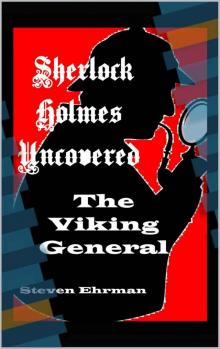 The Viking General (A Sherlock Holmes Uncovered Tale Book 9)
The Viking General (A Sherlock Holmes Uncovered Tale Book 9)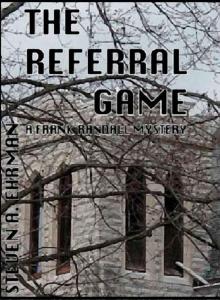 The Referral Game (A Frank Randall Mystery)
The Referral Game (A Frank Randall Mystery) Collection of Four Short Stories
Collection of Four Short Stories The Iron Dog (A Sherlock Holmes Uncovered Tale)
The Iron Dog (A Sherlock Holmes Uncovered Tale) The Eccentric Painter (A Sherlock Holmes Uncovered Tale)
The Eccentric Painter (A Sherlock Holmes Uncovered Tale) The Mad Judge (A Sherlock Holmes Uncovered Tale Book 3)
The Mad Judge (A Sherlock Holmes Uncovered Tale Book 3)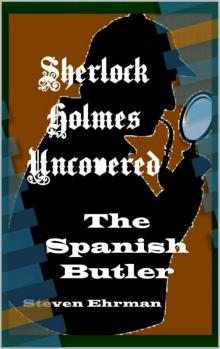 The Spanish Butler (A Sherlock Holmes Uncovered Tale Book 8)
The Spanish Butler (A Sherlock Holmes Uncovered Tale Book 8)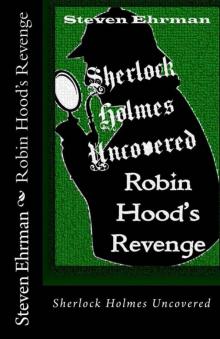 Robin Hood's Revenge (A Sherlock Holmes Uncovered Tale Book 7)
Robin Hood's Revenge (A Sherlock Holmes Uncovered Tale Book 7) Zombie Civilization: Exodus (Zombie Civilization Saga Book 2)
Zombie Civilization: Exodus (Zombie Civilization Saga Book 2)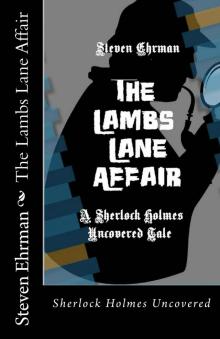 The Lambs Lane Affair (A Sherlock Holmes Uncovered Tale Book 5)
The Lambs Lane Affair (A Sherlock Holmes Uncovered Tale Book 5) Zombie Civilization: Genesis (Zombie Civilization Saga)
Zombie Civilization: Genesis (Zombie Civilization Saga)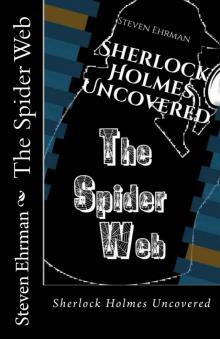 The Spider Web (A Sherlock Holmes Uncovered Tale Book 4)
The Spider Web (A Sherlock Holmes Uncovered Tale Book 4) The Visible Suspect (A Frank Randall Mystery)
The Visible Suspect (A Frank Randall Mystery)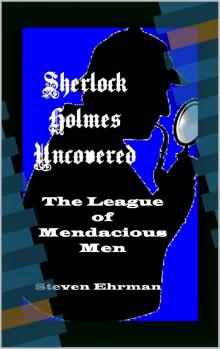 The League of Mendacious Men (A Sherlock Holmes Uncovered Tale Book 10)
The League of Mendacious Men (A Sherlock Holmes Uncovered Tale Book 10)